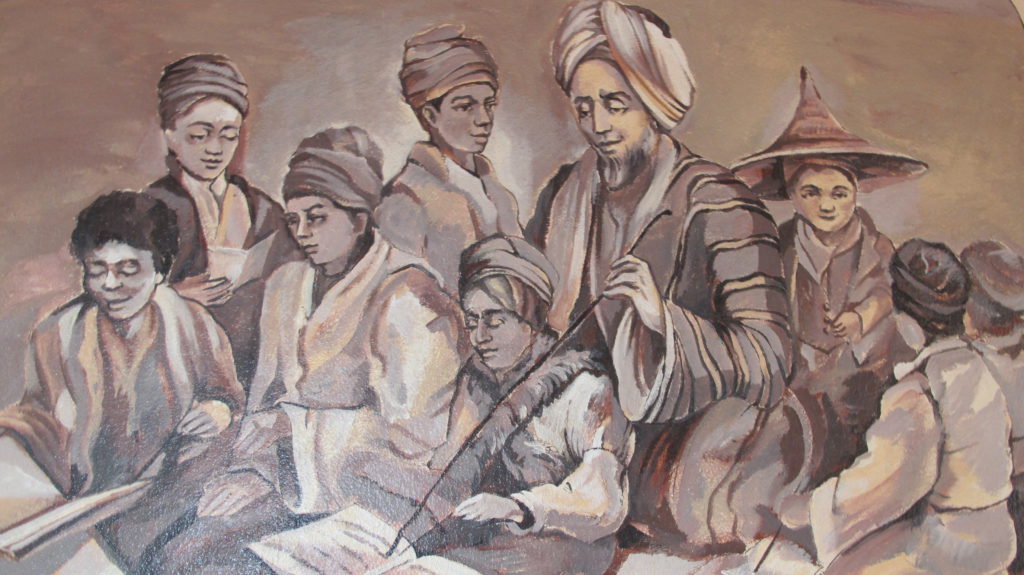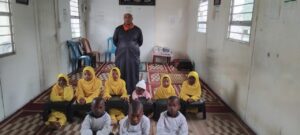
We continue with our series of articles by MYM stalwart, Fuad Hendricks. Following from the previous segment on Mandela, this piece focuses on Tuan Guru; reflecting on how Tuan Guru adds significance to our contemporary lives.
Tuan Guru, like Madiba,was a political prisoner jailed on Robben Island; but at different period in our history. Tuan Guru was imprisoned on Robben Island about 1780, and Madiba in 1963. Both leaders were imprisoned on Robben Island twice.
There are varied historical perspectives as to the exact dates of Tuan Guru’s arrival in Kaap de Goede Hoop and his imprisonment on Robben Island, even the duration of his stay on the Island is contested.
Whilst on Robben Island Tuan Guru completed his handwritten Qur’an from memory reiterating its guidance to humanity which characterises the value system and life of Allah’s (God) Final Messenger, Prophet Muhammad (peace be on him and all the prophets).
Prophet Muhammad’s wife, the esteemed ‘A’ishah, repeatedly stressed that “his way of life (khuluq) was the Qur’an.” The Arabic term khuluq refers to a person’s character, innate disposition, or personality.
Unlike Madiba’s ‘The Long Walk to Freedom’, ‘Conversations with Myself’, his speeches, and other writings, Tuan Guru’s historical record lacks a detailed account of his life and times. But a lack of his recorded history and life confirms the perspective that the victor wrote the history.
In his book ‘From THE SPICE ISLANDS TO CAPE TOWN: THE LIFE AND TIMES OF TUAN GURU’ Shafiq Morton, writes “If it were not for the undying passion of the descendants of Tuan Guru and the pioneering work of people such as Frank Bradlow, Margaret Cairns, and Dr Achmat Davids, Tuan Guru would probably still be a wishful colonial footnote today. Even then, despite the sterling work of these researchers, Tuan Guru has remained an incomplete figure.”
Putting Tuan Guru’s historical record in perspective, Shafiq Morton highlighted the following: “Imam ‘Abdullah ibn Qadi ‘Abd ul-Salam, or Tuan Guru, ‘the Grand Teacher’ (1712-1807), of Tidore in the Moluccas, arrived at the Cape – a ‘place of sadness’ as he once called it – when Europe was writing its version of African history. Most of our documented sources are the Dutch, Portuguese, and English ones.”
Shafiq also duly acknowledged the valuable contribution of several other writers and researchers who focused on the life and times of Tuan Guru.
Tuan Guru resisted Dutch Colonial rule of his homeland. He was about 68 years old when exiled and brought as a political prisoner to South Africa.
Both Tuan Guru and Nelson Mandela (Madiba) advocated dialogue and coexistence between cultures and civilisations rather than its clash.
It was Samuel P. Huntington who postulated in his book ‘Clash of Civilisations’ that people’s religious and cultural identities will be a primary source of conflict. He further advanced the agenda that wars would be fought between cultures. It seems that his thinking and others sharing such perspectives influenced the foreign policy decisions of certain American and European administrations deeming certain cultures and civilisations as allies and others as enemies. In this instance, scholarship provides the text and context for foreign policy formulation.
During the 15th century onwards, the colonial powers scrambled for control of the geopolitical sphere, territory, the spice trade, the economy, and the cloves of Tidore and Ternate, part of modern-day Indonesia. Also, Tidore and Ternate were under the rule of different sultanates who themselves were fighting for control of the spice trade routes. Some of the sultanates collaborated with the respective colonial powers. They opposed one another to maintain their dominance and political rule over the various islands and territories.
Like Madiba, Tuan Guru’s emotional intelligence was tested to the hilt throughout his life and his exile from the Islands of the archipelago of Tidore to South Africa. The hegemonic rise of the colonial powers changed his fate from prince to prisoner of the Dutch who colonised the Island of Tidore.
Tuan Guru’s banishment by the Dutch to Kaap de Goede Hoop also sprouted the seeds of early Islam in South Africa. He arrived in Cape Town in ‘chains’ as a prisoner of the Dutch but in heart, soul, and mind he was a free man firmly rooted in his faith-based civilisation as a Muslim.
His leadership attracted slaves to the call of Islam. They found a social home, sense of community and welcoming worldview where they felt mentally and physically liberated from the shackles of their slave masters. He, together with the rest of the Muslim leadership created a ‘liberated’ community where everyone was a brother or a sister in faith, within the context of a broader colonial society dominated by race and class.
Leo Tolstoy’s opening line in his book ‘Anna Karenina’, “Happy families are all alike; every unhappy family is unhappy in its own way,” arouses mixed feelings about the family.
Both Madiba and Tuan Guru were parents. They were reared and grew up in extended families. The family as an institution remains paramount in terms of directing the destiny of its members.
Essentially and crucially the family is the feeder system for human capital and leadership to all other institutions. These include political parties, state, business enterprises, judiciary, universities, and all the other critical structures at the core of a well-ordered and successful society and country.
Commonly, the family is the cradle where the budding leadership of a community and country is rudimentarily nurtured, developed and given its rock-solid foundation.
Of all the institutions ravaged by colonialism and apartheid the family as a principal institution bore the brunt of its devastation damaging the lives of the many.
Tuan Guru was taught religiously to “seek knowledge from the cradle to the grave” and this meant that the family was the hub where formative leadership development starts and is practiced.
As an Imam of a faith community, Tuan Guru had his hands full in moulding and shaping the many children entrusted by parents to him to teach them their faith traditions and civilizational norms.
During Tuan Guru’s childhood his parents also selected the very best teachers for him to augment their parental teaching and nurturing of their son and his other siblings.
These young souls entrusted to Tuan Guru by their parents who he mentored and coached were each individually unique. Tuan Guru’s mentoring and teaching role was to awaken in them the realisation that Allah (God) considers each one of them as part of the best of creation. Children want reinforcement and reassurance that they are individually very special as part of the collective.
—–
Tuan Guru grew up in an archipelago of islands rich with its indigenous cultures, Islamic civilisational traditions, and value system. It was a social, religious, political, economic, and civilisational environment which shaped his outlook and way of life.
After his mother Boki Nuriniyah gave birth to him his father ‘Abd al-Salam recited in his ear, a supplication expressing his wish that his son would grow up and live his life as a Muslim; a way of life based on the Qur’anic teachings believing in the Oneness, Uniqueness, and Almightiness of God, and following the teachings of Prophet Muhammad and all the other prophets (peace and blessings on them all).
This traditional religious practice to welcome new-born children as pure, naming her or him, and connecting them to a higher purpose and godliness as the “natural inborn disposition and inclination of every human being” forms part of the Qur’anic teachings and role model of Prophet Muhammad (peace and blessings on him).
Tuan Guru was born into a society informed by the Qur’anic teachings “We have honoured the children of (Prophet) Adam” (peace be upon him). Therefore, it was from this premise of common and universal human equality that colonialism was resisted. There is no chosen or preferred race, only a shared and common humanity.
Tuan Guru was part of a joyous society schooled by their elders that “smiling is charity.”
Commonly, the islanders of Tidore and the rest of the archipelago like several of the indigenous tribes of Africa are a musical and harmonious people. Their joyousness was enkindled by their mantras, music, drums, and other musical instruments, lyrics, folklore, and narratives of the ancestors whose dialects speak the common language of our hearts. They are surrounded by so much natural beauty, sustainable resources, gifts of nature, which they perceive as bounties from God.
Soulfully in the Muslim ruled City of Andalusia, Spain, some religious teachers, and healers used music as a therapy to treat and calm mentally challenged patients.
As an Imam in Kaap de Goede Hoop, he acquired a deep spiritual and emotional intelligence insight into the lives of Muslim society, their family life, marriages, children, and the many challenges faced by them and brought to him for solutions and remedial advice.
The role of the Imam in Muslim communities is to lead them not only spiritually but also to guide them to live their lives according to the teachings of the Qur’an and generally the role models of the Prophets.
In the main the Imam personifies the credo that it takes the collective to raise our children.
The Imam touches the lives of every aspect of the family and community. The Imam as the spiritual leader is the go-to-person during happy times when community members get married, the birth of their children, and all other family occasions.
But the Imam is also the shoulder to cry on when their emotional intelligence tumbles, when a marriage falls apart, acrimonious family disputes, times of doubt and uncertainty, crisis of conscience, tough and unmanageable periods, spiritual and emotional discord, or death in the family.
So much is expected of an Imam. The community’s extraordinary demands covering a large part of our lives, which may well exceed even the most capable of souls’ abilities to do justice to the duties of an Imam. But such was the life of an Imam like Tuan Guru.
The exiled son of Tidore transitioned into an African hero, a country which he adopted with all his heart and mind. This was where he lived his final days. He was buried and covered with the African soil on which he toiled to grow and develop an inclusive society. It was the country he came to love, cherish, and made his contribution to a gracious African society which embraces the confluence of all diverse civilizational streams and rich human diversity.
It was an uhuru moment when Madiba paid tribute to him and other exiles who made Africa their home.


